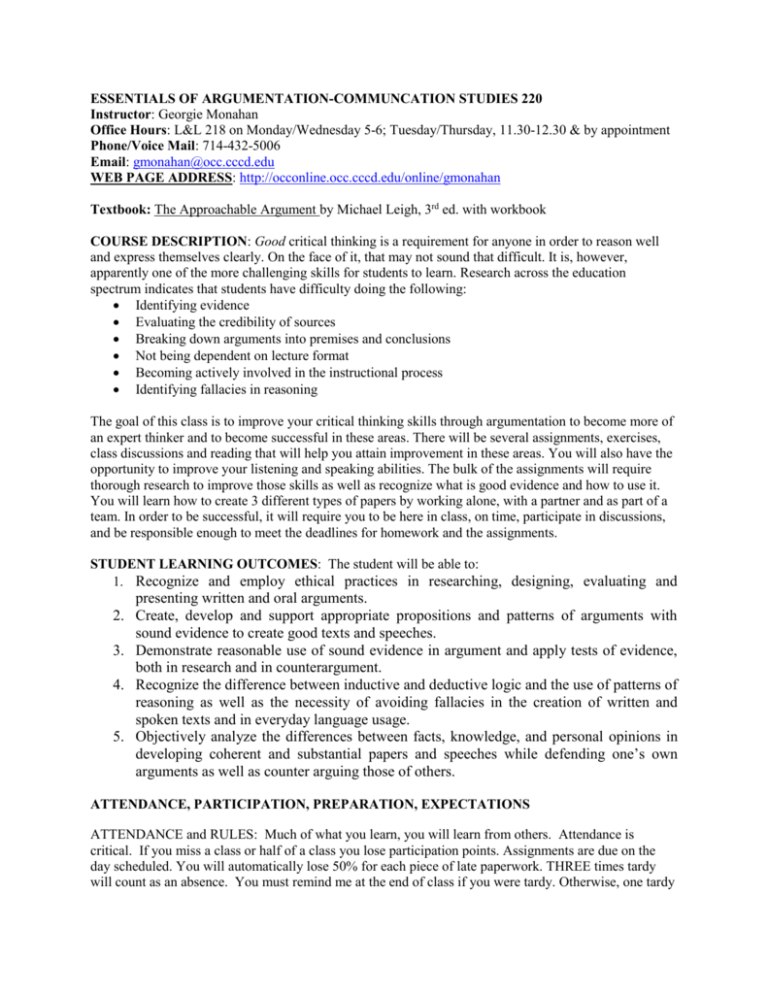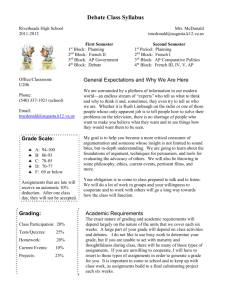essentials of argumentation
advertisement

ESSENTIALS OF ARGUMENTATION-COMMUNCATION STUDIES 220 Instructor: Georgie Monahan Office Hours: L&L 218 on Monday/Wednesday 5-6; Tuesday/Thursday, 11.30-12.30 & by appointment Phone/Voice Mail: 714-432-5006 Email: gmonahan@occ.cccd.edu WEB PAGE ADDRESS: http://occonline.occ.cccd.edu/online/gmonahan Textbook: The Approachable Argument by Michael Leigh, 3rd ed. with workbook COURSE DESCRIPTION: Good critical thinking is a requirement for anyone in order to reason well and express themselves clearly. On the face of it, that may not sound that difficult. It is, however, apparently one of the more challenging skills for students to learn. Research across the education spectrum indicates that students have difficulty doing the following: Identifying evidence Evaluating the credibility of sources Breaking down arguments into premises and conclusions Not being dependent on lecture format Becoming actively involved in the instructional process Identifying fallacies in reasoning The goal of this class is to improve your critical thinking skills through argumentation to become more of an expert thinker and to become successful in these areas. There will be several assignments, exercises, class discussions and reading that will help you attain improvement in these areas. You will also have the opportunity to improve your listening and speaking abilities. The bulk of the assignments will require thorough research to improve those skills as well as recognize what is good evidence and how to use it. You will learn how to create 3 different types of papers by working alone, with a partner and as part of a team. In order to be successful, it will require you to be here in class, on time, participate in discussions, and be responsible enough to meet the deadlines for homework and the assignments. STUDENT LEARNING OUTCOMES: The student will be able to: 1. Recognize and employ ethical practices in researching, designing, evaluating and presenting written and oral arguments. 2. Create, develop and support appropriate propositions and patterns of arguments with sound evidence to create good texts and speeches. 3. Demonstrate reasonable use of sound evidence in argument and apply tests of evidence, both in research and in counterargument. 4. Recognize the difference between inductive and deductive logic and the use of patterns of reasoning as well as the necessity of avoiding fallacies in the creation of written and spoken texts and in everyday language usage. 5. Objectively analyze the differences between facts, knowledge, and personal opinions in developing coherent and substantial papers and speeches while defending one’s own arguments as well as counter arguing those of others. ATTENDANCE, PARTICIPATION, PREPARATION, EXPECTATIONS ATTENDANCE and RULES: Much of what you learn, you will learn from others. Attendance is critical. If you miss a class or half of a class you lose participation points. Assignments are due on the day scheduled. You will automatically lose 50% for each piece of late paperwork. THREE times tardy will count as an absence. You must remind me at the end of class if you were tardy. Otherwise, one tardy will count as an absence because I won't remember to go back and mark you present! Expect that three absences will be a drop. IT IS YOUR RESPONSIBILITY TO DROP THE CLASS. YOU DO NOT NEED MY PERMISSION TO DROP. (And if you do not drop after the last drop date, you will receive a failing grade for the class.) SAFETY VALVE: If you have notified me with a good reason for missing class, you may be able to make up your absence. "Reasonability" is determined by me and your prior commitment and performance in class will influence my decisions. This DOES NOT ALLOW YOU TO MAKE UP ABSENCES ON YOUR PRESENTATION DAYS. Remember, you need to call, catch me in class or e-mail me prior to the missed class for any part of the make-up policy to be in effect. PROCRASTINATION: Please try to curb this habit for this class. Successful "real-world" arguments are usually not the result of preparation the night before. Preparation over a period of time helps you to locate and analyze evidence, formulate claims, warrants, and backing, and internalize the argument in your paper and practice your delivery prior to presentation. These skills are critical to your own sense confidence and their absence is easily noted. There is little time for make-ups. If you know the date assigned is difficult for you, switch with another student but LET ME KNOW IN ADVANCE. If you are not prepared on the day of your presentation and you have not previously made arrangements with me you will suffer a 50% penalty. Then you are required to be prepared AT THE NEXT CLASS MEETING to give your paper. If you are not prepared at that time you may forfeit your chance to present. In cases of extreme emergency, you need to contact me (even if this is only a message on my voice mail) BEFORE THE CLASS SESSION ON YOUR ASSIGNED DATE. Otherwise, you may not avoid the penalty. PROFESSIONALISM: No matter what profession you choose to ultimately pursue, your college classes should prepare you to be a successful individual and team member. In this class, that means taking responsibility for you own actions, working well with others and honoring the attempts of others to improve themselves. A professional atmosphere is dependent on actual behavior, not on intentions. You need to look awake, be awake, and be prepared-eat something nourishing before class. If this class disagrees with your biological clock, find another class or reset the clock. An argumentation class can be one of the best classes you have ever taken if students realize that the class environment can be positive and constructive. This class is about growth and growth is not only awe inspiring, it is fun to watch happen. Some positive behaviors you should monitor are listening, supportiveness, equality, openness, empathy and readiness to participate. On the other hand, some clearly "unprofessional" behaviors you want to avoid are harsh put-downs, sexism, and racism, homophobic language, coming to class under the influence of alcohol or drugs, and plagiarism. These behaviors kill the atmosphere of growth and positiveness and will get you on my wrong side quickly. Plagiarism has becoming a serious issue on college campuses. I will enforce the college standards on this issue. Some other less serious but still important non-professional behaviors includes habitual lateness (see attendance) food or drink in the classroom, and lack of participation. HELP! Please don't hesitate to see me about any problems that arise. Don't be afraid to ask questions during class. Let the whole class benefit from your question rather than trying to grab me at the end of class. I am also available during office hours and by phone. Students who are intent on receiving A's should see me during the semester. ASSIGNMENTS AND GRADING STANDARDS Homework, 6 = (100 points) Tests, 2= (70 points) Midterm (or perfect attendance for first eight weeks) = (35 points) Final (or perfect attendance for second eight weeks) = (35 points) Proposal for 2 papers = (50 points) Proposition of fact paper = (100 points) Selected for Best Fact paper= (25 points) Proposition of value paper= (125 points) Parli debate = (50 points) Policy Paper = (200 points) =790 points total Scale A= 790-711 pts A: Excellent Work! Consistently surpass minimum requirements. Demonstrated insight/original thought. Become a role model in discussions, papers, and homework through asking questions, recalling the material, being prepared, sharing examples, giving feedback, etc.-Gold medal attendance. B= 710-632 pts B: Very good work! Consistently turned work in on time and displayed only a few minor problems. Worked beyond what was required on a couple of assignments and participated at least once in each class. Prepared for class and recalled discussion topics. You made up missed classes for Gold medal attendance. C= 631-553 pts C: Okay! Average! You've done what was expected of you competently with only a few minor problems. You have followed directions well on each assignment. You have been able to use most of the skills in the course with a few problems. While you have demonstrated growth in some areas these are where your skills are still capable of higher achievement. You met the requirements at a minimum level and had a few problems. You clearly could achieve more. Contributes occasionally, a late paper/assignment turned in. D= 552-474 pts D: YIKES!!! Time for self-reflection here! Below average- you have done less than the minimum expected of a student in this class, with many minor problems or one major problem. You have not progressed. You missed more than 9 hours of class. You have rarely contributed questions, comments or critiques. You have had problems and have not come to me for assistance. More than one assignment was probably late. F= 473 pts or less What happened? Extra learning opportunities: Orange Coast College has one of the best speech teams in the state & nation. The team attends several local speech tournaments. Your attendance at the tournaments is voluntary and provides you with an excellent opportunity to see "model" debates and argumentation based events. I will provide extra-points for observing at a tournament. Later in the semester, it is also possible to compete in a tournament at the "rookie" level. Observing at or competing in a tournament is also a way to make up missing classes. The debate portion of the proposition of value assignment also provides extra-credit. I will announce the tournament dates later in class and post them on my website. The team also does “show cases”, demonstrating various events for the campus to see. I will provide that schedule as well. The following is the homework and project due dates for the semester: Date Jan 30 Week 1 Feb 6 Week 2 Feb 13 Week 3 Feb 20 Week 4 Feb 27 Week 5 Mar 6 Week 6 Mar 13 Week 7 Mar 20 Week 8 Mar 27 (½ way) April 3 Week 9 April 10 Week 10 April 17 Week 11 April 24 Week 12 May 1 Week 13 Assignments/Due Dates-REVISED 3/6/2013 Introduction, review Syllabus/assignments Overview CH 1 Lecture/discussion In-class work Homework #1 due Lecture/discussion + Proposal for 2 Topic Ideas discussed Lecture/discussion Proposal for 2 Topic Ideas Due Discussion of Fact brief assignment Lecture/discussion Proposition of Fact Brief Due + Homework # 2- Fact Brief Evidence Discussion of Values + Brief Proposition of Fact Presentations + Discuss Value Debate Value List Homework #3 Due Organize Value Debate groups/teams Test #1 Vocab Go & observe Speech Team Debate + Value debate groups meet Midterm Due VIA EMAIL over the break (to make-up attendance) SPRING BREAK Midterm deadline Work in Value debate groups + Lecture/discussion – Fallacies Work in Value Debate teams + Fallacies Homework # 4-Value Brief Evidence Due Proposition of Value Brief Due + Parli Debate 1&2 Fallacies Parli Debate 3&4 Proposition of Policy Brief Discussed Parli Debate 5&6 Homework #5-Policy Brief Evidence Due May 8 Week 14 May 15 Week 15 May 22 Week 16 Test # 2 Fallacies Final clarification & discussion for Policy Brief Proposition of Policy Brief Due Town Hall Meeting COMMENCEMENT-5.30-PACIFIC AMPHITHEATRE






